
Do you find yourself tossing and turning at night, struggling to fall asleep?
Getting a good night’s sleep starts with being able to fall asleep quickly and easily. Unfortunately, many people struggle with this aspect of sleep, often lying awake for hours before finally drifting off.
The good news is that there are simple, natural techniques you can try to help you fall asleep faster and wake up feeling refreshed.
Here are the most effective tips to help you fall asleep faster and easily:
A. Establishing a Bedtime Routine
Establishing a consistent bedtime routine is an essential component of promoting healthy sleep habits.
By following a set of relaxing activities leading up to bedtime, you can signal to your body that it’s time to wind down and prepare for sleep.
Here are some additional tips for creating a successful bedtime routine:
1. Wind down with calming activities
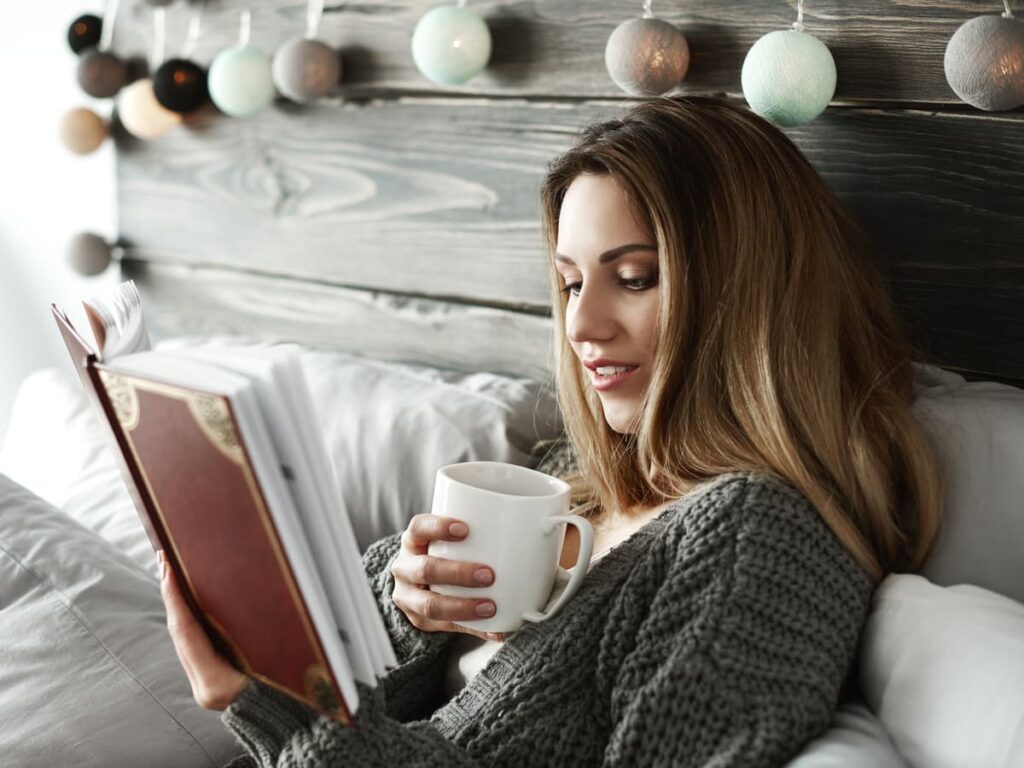
Engage in calming activities that you find relaxing, such as reading a book, taking a warm bath or shower, or practicing gentle yoga or stretching.
These activities can help release physical and mental tension, calming your body and preparing you for sleep.
2. Avoid electronic devices before bed:
The blue light emitted by electronic devices can interfere with your body’s natural sleep rhythms, making it harder to fall asleep.
Try to avoid using your phone, tablet, or computer for at least an hour before bed, or use a blue light filter or dimming tool to reduce the impact.
3. Create a comfortable sleep environment:
Your bedroom should be conducive to sleep, with a comfortable mattress and pillows, cool temperatures, and minimal noise and light.
Use curtains or shades to block out excess light, and invest in high-quality bedding and sleepwear that help regulate your body temperature and create a cozy atmosphere.
4. Use aromatherapy:
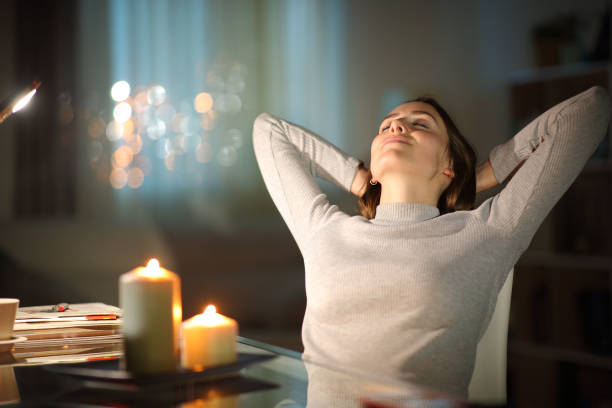
Some essential oils, such as lavender or chamomile, have relaxing properties that can help promote sleep.
Use a diffuser or add a few drops to a warm bath or shower to create a calming environment.
5. Avoid stimulating activities:
Avoid activities that can stimulate your brain and make it harder to fall asleep, such as watching TV, using social media, or engaging in vigorous exercise.
Instead, choose activities that help you relax and unwind, such as listening to soothing music or practicing deep breathing exercises.
By creating a consistent bedtime routine that includes relaxing activities and avoids stimulating ones, you can train your body to recognize when it’s time to sleep and prepare for restful slumber.
Remember to stick to your routine as closely as possible, even on weekends or vacations, to maintain a healthy sleep schedule and promote quality sleep.
B. Relaxation Techniques to Fall Asleep Faster
Relaxation techniques can help calm your mind and body, making it easier to fall asleep. Here are some additional relaxation techniques to try:
6. Progressive Muscle Relaxation:
This technique involves tensing and releasing different muscle groups to help release physical tension and promote relaxation.
Start by tensing the muscles in your feet and working your way up to your head, squeezing each muscle group for a few seconds before releasing. Focus on the feeling of relaxation that comes with releasing the tension.
7. Mindfulness Meditation:
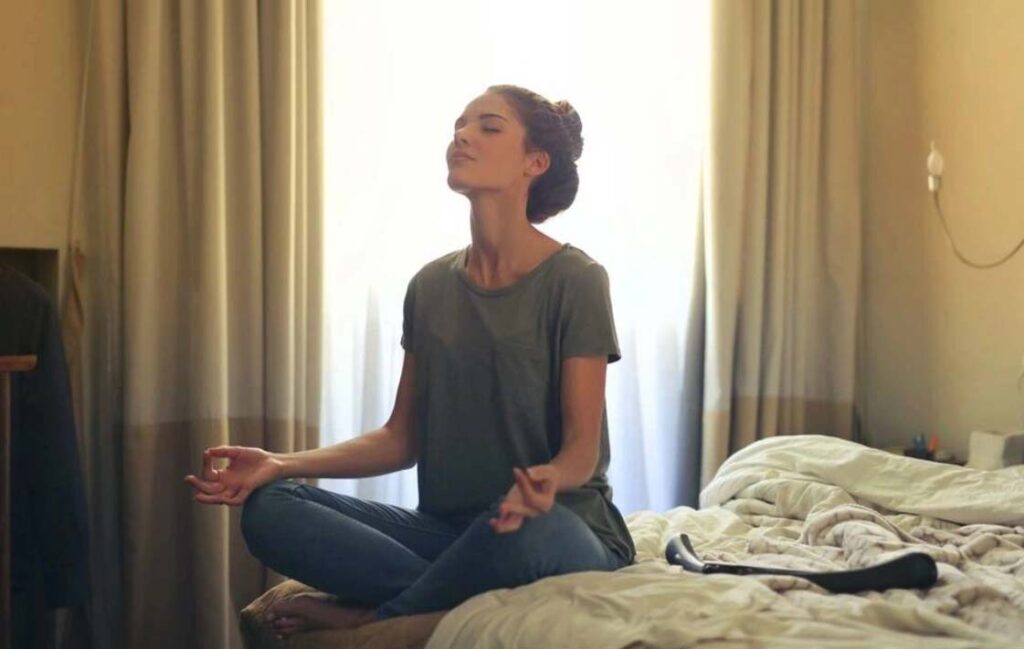
Mindfulness meditation involves focusing on the present moment and accepting your thoughts and feelings without judgment.
To practice mindfulness meditation, sit or lie down in a comfortable position and focus on your breath. When your mind wanders, gently bring your attention back to your breath.
Start with a few minutes a day and gradually increase the time.
8. Deep Breathing:
Deep breathing exercises can help slow down your breathing and promote relaxation.
Find a comfortable seated or lying position and inhale deeply through your nose, filling your lungs with air. Hold your breath for a few seconds, then exhale slowly through your mouth. Repeat for several minutes.
9. Visualization:
Visualization involves imagining a peaceful and calming scene in your mind, such as a beach, forest, or mountain landscape.
Close your eyes and picture yourself in this scene, using all your senses to make it as vivid as possible. Focus on the feelings of relaxation and tranquility that come with the visualization.
10. Yoga:
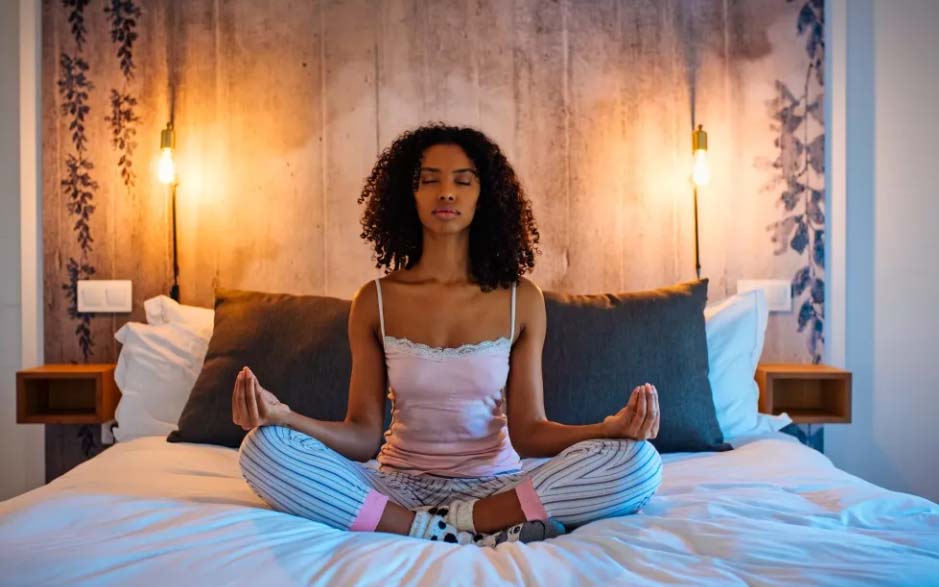
Yoga is a gentle form of exercise that combines physical movement with breathing techniques and mindfulness. It can help reduce stress and tension, promoting relaxation and sleep.
Try practicing gentle yoga poses, such as Child’s Pose, Cat-Cow, and Legs Up the Wall, before bed.
Remember to choose the techniques that work best for you and make them a regular part of your routine. With practice, relaxation techniques can become an effective tool for reducing stress and promoting quality sleep.
C. Sleep-Inducing Foods and Drinks
What you eat and drink can have a significant impact on your sleep quality. Consuming certain foods and drinks before bed can help promote relaxation and support restful sleep.
Here are some additional sleep-inducing foods and drinks to consider:
11. Warm Milk:
Warm milk is a classic sleep-inducing beverage that can help promote relaxation.
Milk contains tryptophan, an amino acid that is converted to serotonin and then melatonin, two hormones that help regulate sleep.
12. Tart Cherry Juice:
Tart cherry juice is high in natural melatonin, a hormone that helps regulate sleep-wake cycles.
Drinking tart cherry juice before bed may help promote deeper, more restful sleep.
13. Chamomile Tea:

Chamomile tea is a caffeine-free herbal tea that has been used for centuries to promote relaxation and calmness.
It may help reduce anxiety and improve sleep quality, making it an excellent choice for bedtime.
14. Almonds:
Almonds are a rich source of magnesium, a mineral that can help promote relaxation and reduce stress.
Eating a handful of almonds before bed may help calm your mind and support restful sleep.
15. Bananas:
Bananas are a good source of potassium and magnesium, two minerals that can help relax your muscles and promote sleep.
They also contain tryptophan, the amino acid that helps produce melatonin.
16. Kiwi:
Kiwi is a low-calorie fruit that is high in vitamin C and antioxidants. It also contains serotonin and other compounds that may help promote sleep.
Eating kiwi before bed may help improve sleep quality and duration.
17. Herbal Supplements:
Some herbal supplements, such as valerian root, passionflower, and ashwagandha, may help promote relaxation and improve sleep quality.
Always talk to your doctor before taking any supplements, especially if you are on any medications or have underlying health conditions.
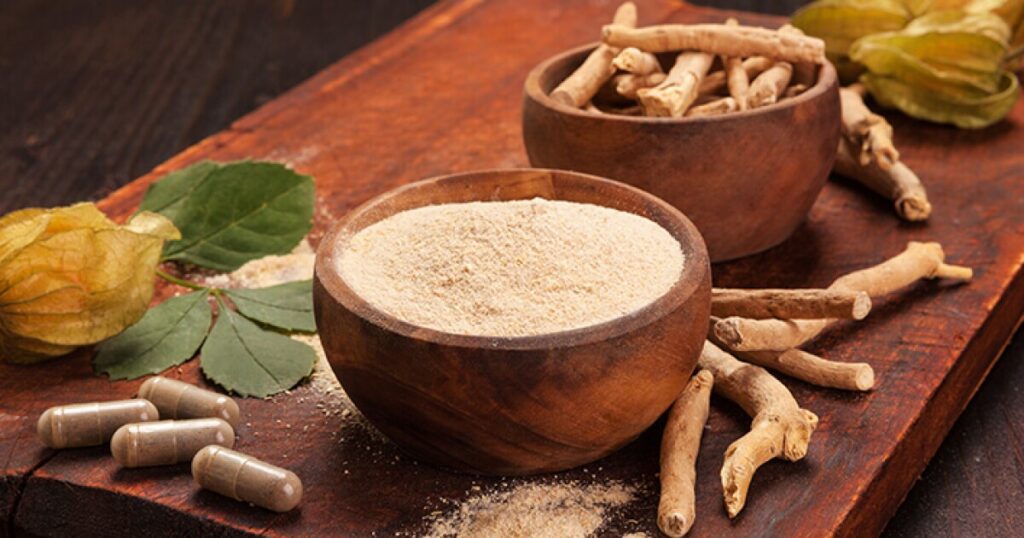
Remember that while sleep-inducing foods and drinks can be helpful, it’s also important to eat a balanced diet and avoid heavy, spicy, or fatty meals close to bedtime.
Stick to small portions and choose foods that are easy to digest to avoid discomfort or indigestion that can interfere with sleep.
D. 8 Tips for Creating a Sleep-Conducive Environment
The environment you sleep in can have a significant impact on your sleep quality. Creating a sleep-conducive environment can help promote relaxation and support restful sleep.
Here are some additional tips for creating a sleep-conducive environment:
18. Keep Your Bedroom Cool:
Keeping your bedroom cool can help promote sleepiness and prevent overheating, which can interfere with sleep.
The ideal temperature for sleep is between 60 and 67 degrees Fahrenheit (15.6 to 19.4 degrees Celsius). I personally prefer 25 degrees Celsius as anything below feels too cold for me to sleep (not to mention my electricity bills).
19. Block Out Light and Noise:
Light and noise can disrupt your sleep by interfering with your body’s natural sleep-wake cycle.
Use blackout curtains, shades, or eye masks to block out light and earplugs or a white noise machine to mask unwanted noise.
20. Invest in a Comfortable Mattress and Pillow:
Your mattress and pillow play a critical role in supporting comfortable and restful sleep.
Choose a mattress and pillow that are comfortable and supportive, and replace them every 7-10 years.
21. Choose Soothing Colors:
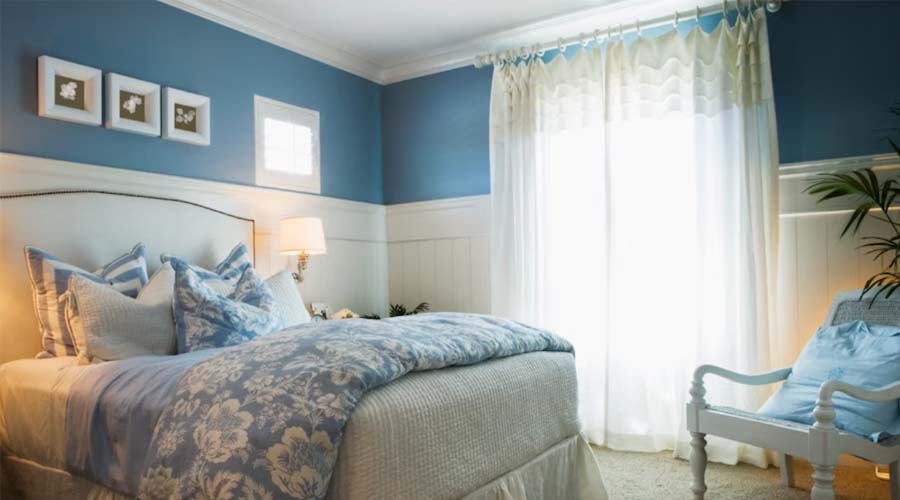
The colors you use in your bedroom can affect your mood and emotions.
Choose soothing colors, such as blues, greens, and soft grays, to create a calming and relaxing environment.
22. Minimize Clutter:
A cluttered bedroom can create a sense of chaos and anxiety, which can interfere with sleep.
Keep your bedroom tidy and organized to promote a sense of calm and relaxation.
23. Keep Electronics out of the Bedroom:
Electronic devices emit blue light, which can suppress the production of melatonin, the hormone that regulates sleep.
Keep electronics, such as TVs, computers, and smartphones, out of the bedroom, or use blue light-blocking glasses or settings.
24. Use Comfortable Lighting:
Harsh, bright lighting can disrupt your body’s natural sleep-wake cycle and make it harder to fall asleep.
Choose soft, warm lighting for your bedroom to create a relaxing, comfortable atmosphere.
Use dimmer switches to adjust the brightness of your lighting to your liking. Use blackout curtains or shades to block out light from streetlights or early morning sun.
25. Make your Bedroom a Sanctuary:
Your bedroom should be a peaceful, calming sanctuary where you can unwind and relax. Invest time and effort in creating a space that promotes restful sleep and relaxation.
Making your bedroom a sanctuary means creating a peaceful and relaxing atmosphere that promotes restful sleep.
This can involve a variety of elements, including color scheme, furniture placement, and decorative accents.
Decorative elements such as pillows, blankets, and artwork can also contribute to a more peaceful sleep environment.
Choose items that are soft and cozy to the touch, such as plush pillows and blankets made from natural fibers like cotton or wool.

Remember that creating a sleep-conducive environment is an ongoing process. Experiment with different techniques and strategies until you find the ones that work best for you.
With practice and consistency, you can create a bedroom that promotes relaxation and restful sleep.
Conclusion
By implementing these tips and strategies, you can improve your ability to fall asleep faster and more easily, setting yourself up for a better night’s rest.
Getting enough restful sleep is crucial for maintaining good health and overall well-being.
By establishing a bedtime routine, practicing relaxation techniques, and making simple lifestyle changes, you can train your body to fall asleep faster and enjoy a more restful night’s sleep.
Take the time to experiment with different strategies until you find the ones that work best for you.
With patience and consistency, you can improve your sleep quality and wake up feeling energized and ready to take on the day.
Read more: Understanding Your Sleep Cycle: The Four Stages of Non-REM Sleep and REM Sleep
